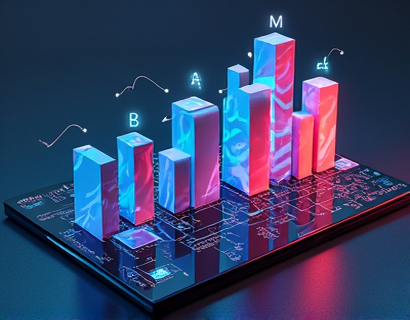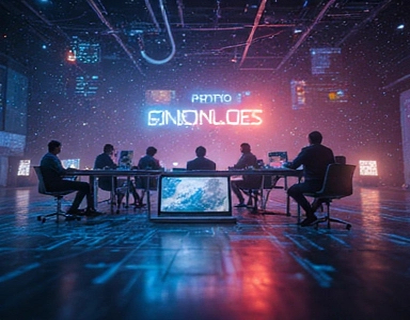Smart Contracts and Management Tools: Revolutionizing Governance for Enhanced Democracy and Participation
In recent years, the intersection of technology and governance has given rise to innovative solutions aimed at transforming traditional democratic processes. Among these, smart contracts and advanced management tools stand out as pivotal elements in creating a more transparent, efficient, and participatory governance system. This article delves into the transformative potential of these technologies, exploring how they can streamline decision-making, enhance transparency, and boost community engagement, ultimately fostering a more universal and participatory democracy.
The Role of Smart Contracts in Governance
Smart contracts are self-executing contracts with the terms of the agreement directly written into code. They run on blockchain technology, a decentralized and immutable ledger that ensures transparency and security. In the context of governance, smart contracts can automate and enforce the execution of agreements and policies, reducing the need for intermediaries and minimizing the potential for human error or manipulation.
One of the most significant advantages of smart contracts in governance is their ability to enforce rules and regulations automatically. For instance, in the realm of public procurement, smart contracts can ensure that all bids are evaluated based on predefined criteria, and the winner is selected and paid automatically once the conditions are met. This not only speeds up the process but also increases accountability and reduces the scope for corruption.
Enhancing Transparency through Blockchain
Transparency is a cornerstone of democratic governance, and blockchain technology, the backbone of smart contracts, plays a crucial role in achieving this. The immutable nature of blockchain ensures that once a transaction or contract is recorded, it cannot be altered or deleted. This provides an unalterable record of all governance activities, from budget allocations to policy implementations.
Citizens can access this information in real-time, gaining insights into how their government operates. This level of transparency builds trust between the government and the governed, as citizens can verify the execution of policies and the use of public funds. Moreover, the decentralized nature of blockchain means that no single entity has control over the data, reducing the risk of data manipulation or loss.
Streamlining Decision-Making Processes
Smart contracts and blockchain technology can significantly streamline decision-making processes in governance. Traditional methods often involve multiple layers of approval and can be slow and cumbersome. With smart contracts, decisions can be programmed to execute automatically when certain conditions are met, reducing the time and effort required for manual processes.
For example, in the context of emergency response, smart contracts can be set up to release funds for relief efforts as soon as specific criteria, such as the confirmation of a disaster, are met. This immediate response can be critical in saving lives and resources. Similarly, in budgeting, smart contracts can automate the allocation of funds based on predefined parameters, ensuring that resources are used efficiently and effectively.
Boosting Community Engagement
One of the most promising aspects of smart contracts and management tools is their potential to enhance community engagement. By providing a transparent and accessible platform for governance, these technologies can encourage more citizens to participate in the decision-making process. This increased participation is essential for building a more inclusive and representative democracy.
For instance, smart contracts can facilitate direct democracy mechanisms such as referendums and initiatives. Citizens can propose and vote on policies through a secure and transparent digital platform. The results are recorded on the blockchain, ensuring that the outcome is tamper-proof and widely accessible. This not only increases the legitimacy of the decision but also fosters a sense of ownership and responsibility among citizens.
Innovative Management Tools for Governance
Beyond smart contracts, innovative management tools are emerging to support governance in various ways. These tools leverage data analytics, artificial intelligence, and user-friendly interfaces to make governance more efficient and accessible. One such tool is a digital governance platform that integrates multiple functions, from policy proposal and voting to budget management and public feedback.
These platforms can centralize governance activities, providing a one-stop-shop for citizens and officials to interact with the government. For example, a citizen can propose a new policy, gather support through a digital petition, and vote on it all within the platform. The platform can also analyze public feedback and sentiment, helping policymakers make more informed decisions.
Data-Driven Governance
Data plays a crucial role in modern governance, and innovative management tools are enhancing the way data is collected, analyzed, and utilized. By leveraging big data and advanced analytics, governments can gain insights into citizen needs, identify trends, and optimize resource allocation. Smart contracts can further enhance this by ensuring that data is accurately recorded and transparently shared.
For instance, a city government can use data analytics to monitor traffic patterns and optimize public transportation schedules. Smart contracts can automate the adjustment of schedules based on real-time data, ensuring that the system is always running efficiently. This data-driven approach not only improves service delivery but also increases public trust in the government's ability to manage resources effectively.
Challenges and Considerations
While the potential of smart contracts and management tools in governance is vast, there are several challenges and considerations that must be addressed. One of the primary concerns is the digital divide, where not all citizens have equal access to technology. Ensuring that these tools are accessible to all, including those in underserved communities, is crucial for achieving inclusive governance.
Another challenge is the need for robust cybersecurity measures to protect the integrity of the blockchain and the data it holds. Given the sensitive nature of governance data, it is essential to implement strong security protocols to prevent unauthorized access or attacks.
Additionally, there is a need for regulatory frameworks that support the adoption of these technologies while ensuring accountability and transparency. Governments and organizations must work together to develop guidelines that balance innovation with the protection of citizens' rights and interests.
Case Studies and Real-World Applications
Several initiatives around the world are already leveraging smart contracts and management tools to enhance governance. One notable example is the use of blockchain in Estonia, a country that has embraced digital governance. Estonia's e-Residency program allows non-citizens to access digital public services, including voting in certain elections, through a secure and transparent platform.
Another example is the city of Zug in Switzerland, known as the "Crypto Valley," where various blockchain-based governance projects are being piloted. One such project uses smart contracts to manage public parking, reducing administrative costs and improving efficiency.
These case studies demonstrate the practical applications and benefits of integrating smart contracts and management tools into governance. They serve as blueprints for other regions looking to innovate and improve their democratic processes.
Conclusion
The integration of smart contracts and management tools in governance represents a significant step towards a more transparent, efficient, and participatory democracy. By automating processes, enhancing transparency, and boosting community engagement, these technologies have the potential to revolutionize how governance is conducted. As more individuals and organizations recognize the benefits of these innovations, we can expect to see a new era of collaborative decision-making and effective management solutions.
Embracing these technologies is not just about adopting new tools; it's about reimagining the very foundations of governance to better serve the needs of the people. By doing so, we can build a more inclusive, responsive, and resilient democratic system for the future.











































